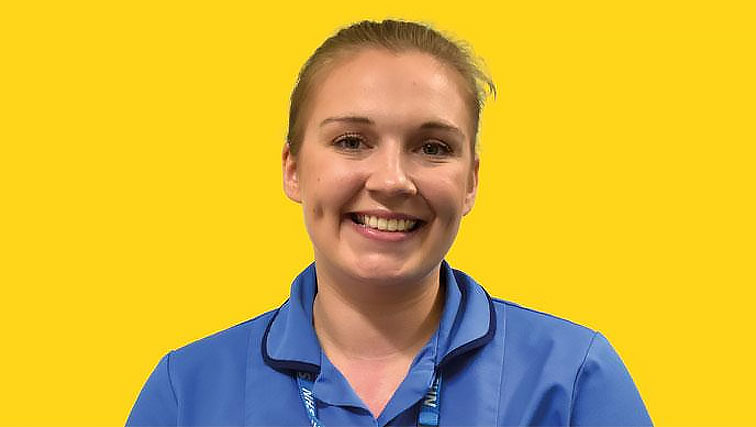
Why Community Nursing is not just for Older Nurses
This article by Community Nurse, Samantha Hayman, is published by Nursing in Practice.
A report released by the Health Foundation earlier this year highlighted the ongoing NHS staff shortages in key areas, including community care. The number of nurses and health visitors working in community health services continued their long-term decline, falling by 1.2% in July 2018 compared to a year before.
Another report from the Royal College of Nursing and Queen’s Nursing Institute published in May highlighted that the number of district nurses working in the NHS has dropped by almost 43% in England alone in the last ten years.
Leicestershire Partnership NHS Trust is trying to address this shortage and is encouraging younger nurses to consider a community-based role.
I am one of the younger community nurses working at the Trust and joined fairly soon after qualifying in 2017. I am really keen to dispel the myth that community nursing is just for older nurses, despite it being a role I was advised not to do straight from university.
My first taste of community nursing was towards the end of my first year studying an adult nursing degree at De Montfort University, Leicester, when I was allocated a placement in community nursing. I thoroughly enjoyed my time there and went away feeling that this was the type of nursing for me.
But as I continued with my studies, I heard various comments which discouraged me from community nursing. These comments, which were expressed by a variety of teaching and healthcare professionals, suggested that community nursing was ‘for the more mature nurse’. We were also encouraged, collectively as students, to begin our career as a newly qualified nurse in a hospital setting to ‘gain more skills’.
After qualifying, I initially worked on an acute care of the elderly male ward – but quickly realised that this wasn’t the role for me.
Unfortunately, staff shortages meant that I couldn’t give my patients the undivided attention I felt they needed. I was always being pulled away to do other tasks, which meant I often ended up feeling like I wasn’t doing a good job for the patients.
During this time, I started reflecting back on my placement in community nursing, and in particular how the time and attention for an individual patient was valued and protected. I noticed a vacancy in a community team had become available at Leicestershire Partnership NHS Trust and I applied, leaving the hospital a few months later.
Community nursing is the role for me
I’m so glad I made the move into community nursing. I absolutely love my job, especially the variety of patients that I care for. I also believe I have learnt so much more in this role than I did in my previous job.
I provide nursing care for a range of patients, from those who require support and education to those with complex needs. One of the things I enjoy most about community nursing is being able to assess each individual patient from a holistic perspective.
This enables me to consider not only their physical health needs but their spiritual, cultural, psychological and social needs – even those the patient may not have considered previously.
I am then able to provide patient-specific interventions that are primarily supportive, educational and focused on self-care and functional independence, thereby reducing the need for hospital admission.
We deliver care as part of a multidisciplinary team, integrated with other services and supported when necessary by specialist services with competencies in managing specific conditions.
One of the key differences within community nursing is that the care is predominantly nurse-led as opposed to doctor-led. Although the role is fairly autonomous, I never work in isolation and have a great professional support structure around me. We provide direct links to GPs and specialists services such as tissue viability, palliative care and complex care nurses.
Whereas in my previous role I had developed in-depth knowledge of one area of nursing, my understanding now spans a range of different topics. With this breadth of skills and experience, I can deliver quality care to patients who are often complex with multimorbidity.
I am able to deliver a variety of interventions such as continence care, administration of medications, maintenance of peripherally inserted central catheter lines, palliative care, and wound care including surgical, traumatic and those attributable to pressure damage.
This has empowered me to become much more confident in my abilities and enabled me to use my judgement when providing care – not to mention an undeniable feeling of satisfaction.
It is important to consider not only the patient but their family, who are often providing care for their loved ones. You develop professional relationships along the way and they are always so thankful for your support.
Career development
One the great things about working for Leicestershire Partnership NHS Trust is that they really encourage my professional development as a nurse.
My colleagues are amazing and the management really supportive. At lunchtime, we often regroup to discuss our morning visits and to raise any concerns that we may have; it also gives us the opportunity to offer help and support to each other.
Management is keen for me to progress my career and there are plenty of training opportunities provided by the trust, many of which I have completed. These include wound care, lower limb training, diabetes, palliative care, and continence care.
There are also ‘Learning Beyond Registration’ modules available, which are credited modules run by the local university.
I want to continue learning and working my way up to managing an area or perhaps become a district nurse. There are lots of pathways I could choose, which is a real benefit of working in a community setting.
For nurses considering their next career move, I would definitely recommend community nursing. Whether they are newly qualified or have years of experience, the role suits anyone with a real passion for helping people and who relishes the variety that comes with the role.
It’s a great opportunity for learning and no two days are the same. I love spending time with the patients and I really enjoy getting up and going to work every day. I can’t say that about any other job I’ve had.
Samantha Hayman is a community nurse at Leicestershire Partnership NHS Trust.
Leicestershire Partnership NHS Trust is part of a the recruitment campaign Y/Our Future that unites five major health and social care employers – University Hospitals of Leicester NHS Trust, Leicestershire Partnership NHS Trust, LOROS Hospice, Rutland County Council and Leicester City Council – to recruit doctors, nurses and health and social care workers to work in Leicester, Leicestershire and Rutland.






